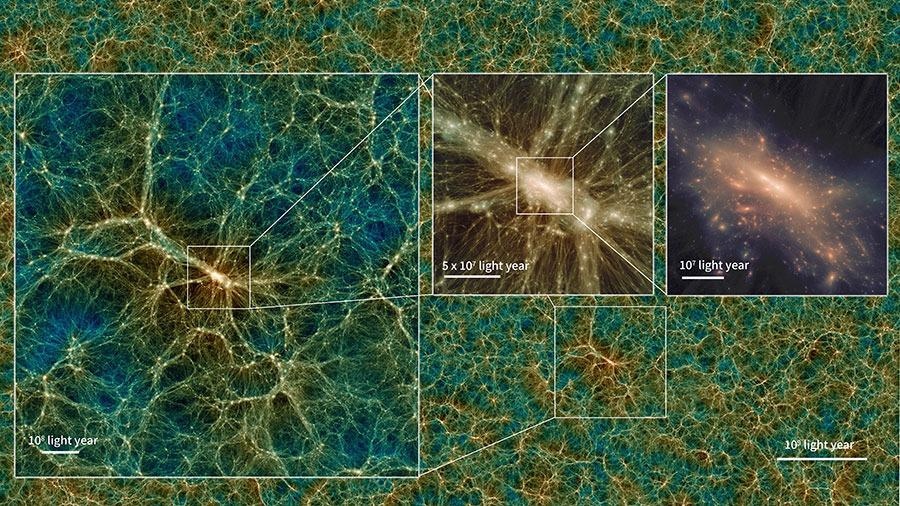An international team of researchers has created a whole new virtual universe and made it freely accessible on the cloud. Uchuu, which means outer space in Japanese, is the largest and most realistic simulation of the universe found today.
 The distribution of dark matter in a snapshot from Uchuu. The images show the dark matter halo of the largest galaxy cluster formed in the simulation at different magnifications. Image Credit: Tomoaki Ishiyama.
The distribution of dark matter in a snapshot from Uchuu. The images show the dark matter halo of the largest galaxy cluster formed in the simulation at different magnifications. Image Credit: Tomoaki Ishiyama.
The Uchuu simulation comprises 2.1 trillion particles in a computational cube, an unmatched 9.63 billion light-years to a side.
In comparison, that is about three-quarters the distance between Earth and the most distant galaxies. Uchuu will enable the study of the evolution of the Universe on a level of both size and detail inconceivable so far.
Uchuu concentrated on the large-scale structures of the universe, like the mysterious halos of dark matter which control not only the formation of galaxies but also the proceedings of the entire universe itself. The scale of these structures lies between the largest galaxy clusters down to the smallest galaxies.
It is possible to find any alien civilization in the Uchuu as individual stars and planets are not resolved. However, a way in which Uchuu wins big in comparison to other virtual worlds is the time domain. Uchuu is capable of simulating the evolution of matter over almost the whole of the 13.8 billion-year history of the universe starting from the Big Bang until today. This is almost 30 times the time when the animal life first crawled out of the seas on Earth.
Uchuu is like a time machine: we can go forward, backward and stop in time, we can ‘zoom in’ on a single galaxy or ‘zoom out’ to visualize a whole cluster, we can see what is really happening at every instant and in every place of the Universe from its earliest days to the present, being an essential tool to study the Cosmos.
Julia F. Ereza, PhD Student, Instituto Astrofísica Andalucía, Consejo Superior de Investigaciones Científicas
An international team of researchers from Japan, Spain, the United States, Argentina, Australia, Chile, France and Italy developed Uchuu using ATERUI II, which is the world’s most powerful supercomputer dedicated to astronomy. It still took a year, using this powerful tool, to produce Uchuu.
To produce Uchuu we have used ... all 40,200 processors (CPU cores) available exclusively for 48 hours each month. Twenty million supercomputer hours were consumed, and 3 Petabytes of data were generated, the equivalent of 894,784,853 pictures from a 12-megapixel cell phone.
Tomoaki Ishiyama, Associate Professor, Chiba University
The researchers employed high-performance computational methods to compress data on the formation and evolution of dark matter haloes in the Uchuu simulation into a 100-terabyte catalog.
The catalog can be accessed by everyone to use the format. The credit goes to the computational infrastructure skun6 situated at the Instituto de Astrofísica de Andalucía (IAA-CSIC), the RedIRIS group and the Galician Supercomputing Center (CESGA). Future information releases will include catalogs of virtual galaxies and gravitational lensing maps.
Big Data science products from Uchuu will support astronomers to understand Big Data galaxy surveys expected in the future from facilities like the Subaru Telescope and the ESA Euclid space mission.
Journal Reference:
Ishiyama, T., et al. (2021) The Uchuu simulations: Data Release 1 and dark matter halo concentrations. Monthly Notices of the Royal Astronomical Society. doi.org/10.1093/mnras/stab1755.